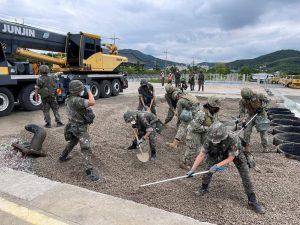In an unprecedented move, the military is set to implement cognitive tests for troops who have been exposed to the intense rigors of artillery, gunfire, and explosions. This groundbreaking initiative aims to assess and monitor the mental well-being of servicemembers who have faced the harsh realities of combat, shedding light on the lasting effects of such traumatic experiences. Join us as we delve into the significance of these tests and explore the potential benefits they may bring to our brave men and women in uniform.
Understanding the Impact of Combat Exposure on Cognitive Health
Recent studies have shown that combat exposure to artillery, gunfire, and explosions can have a significant impact on the cognitive health of troops. To address this issue, the military has announced that they will begin implementing cognitive tests for soldiers who have been exposed to these types of combat scenarios.
These tests will help assess the cognitive functions of affected troops and identify any potential challenges they may face in their day-to-day activities. By providing early interventions and support, the military aims to improve the overall well-being and performance of service members who have been exposed to intense combat situations. This initiative highlights the importance of understanding the long-term effects of combat exposure on cognitive health and the need for proactive measures to support the mental well-being of our military personnel.
Implementing Cognitive Testing Protocols for Service Members
In an effort to better assess and address the cognitive health of service members who have been exposed to artillery, gunfire, and explosions, the military will be implementing cognitive testing protocols. These tests aim to identify any potential cognitive deficits or issues that may arise as a result of exposure to these combat-related activities.
The cognitive testing protocols will involve a series of assessments and evaluations designed to measure various cognitive functions, including memory, attention, and decision-making skills. Through these tests, military officials hope to gain a better understanding of the impact of combat exposure on the cognitive health of service members, and to provide targeted support and interventions as needed. By proactively addressing cognitive health issues, the military aims to ensure the overall well-being and readiness of its troops.
Promoting Early Detection and Intervention for Combat-related Cognitive Issues
As part of a new initiative, the military will be implementing cognitive tests for troops who have been exposed to artillery, gunfire, and explosions in combat. Early detection and intervention for combat-related cognitive issues are crucial in helping service members receive the proper support and treatment they need.
By identifying cognitive issues early on, military officials hope to provide targeted interventions and support services to help service members recover and thrive. These cognitive tests will help assess memory, attention, and executive functions to ensure that those who have been exposed to traumatic events receive the necessary care. Through these efforts, the military aims to prioritize the mental health and well-being of its troops, promoting a culture of support and understanding for those who have served.
Ensuring the Long-term Well-being of Troops Through Cognitive Assessment
The military has recently announced a new initiative aimed at prioritizing the long-term well-being of troops who have been exposed to artillery, gunfire, and explosions. As part of this effort, cognitive assessments will be conducted to evaluate the mental health and cognitive functions of these service members. These assessments will help identify any cognitive impairments or changes that may have occurred as a result of their exposure to traumatic events.
By implementing cognitive tests for troops who have experienced high-intensity combat situations, the military aims to provide early intervention and support for those who may be at risk for long-term cognitive issues. Through regular assessments and monitoring, the military can ensure that troops receive the necessary care and resources to maintain their cognitive health and well-being over the long term. This proactive approach underscores the military’s commitment to supporting the mental health of its service members and promoting overall readiness and resilience.
The Conclusion
As the military takes steps to prioritize the cognitive well-being of its troops, the implementation of cognitive tests for those exposed to artillery, gunfire, and explosions marks a significant advancement in addressing the mental health challenges faced by service members. By identifying and addressing potential cognitive impairments early on, the military aims to better support and care for those who have sacrificed so much in service to their country. This proactive approach not only serves to protect the well-being of our troops, but also underscores the military’s commitment to ensuring the long-term health and readiness of its personnel. Through ongoing research and support initiatives, the military continues to demonstrate its dedication to the mental health and overall welfare of those who bravely serve.


